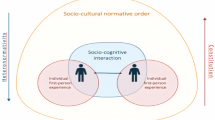Abstract
Human morality may be thought of as a negative feedback cotrol system in which moral rules are reference values, and moral disapproval, blame, and punishment are forms of negative feedback given for violations of the moral rules. In such a system, if moral agents held each other accountable, moral norms would be enforced effectively. However, even a properly functioning social negative feedback system could not explain acts in which individual agents uphold moral rules in the face of contrary social pressure. Dr. Frances Kelsey, who withheld FDA approval for thalidomide against intense social pressure, is an example of the degree of individual moral autonomy possible in a hostile environment. Such extreme moral autonomy is possible only if there is internal, psychological negative feedback, in addition to external, social feedback. Such a cybernetic model of morality and moral autonomy is consistent with certain aspects of classical ethical theories.
Similar content being viewed by others
References
Kekes, J. (2000) The enforcement of morality, American Philosophical Quarterly 37(1): 23–35.
Pritchard, M.S. (1998) Professional responsibility: Focusing on the exemplary, Science and Engineering Ethics 4 (2): 215–233.
Spier, R.E. (1996) Editorial — Ethics as a control system component, Science and Engineering Ethics 2 (3): 259–262.
Coleman, J. (1990) Foundations of Social Theory, Harvard University Press, Cambridge, MA, USA.
Lewis, F.L. (1992) Applied Optimal Control and Estimation, Prentice-Hall, Englewood Cliffs, NJ, USA.
Rosenblueth, A., Wiener, N., Bigelow, J. (1943) Behavior, purpose, and teleology, Philosophy of Science 10: 18–24. Reprinted in Buckley, W. (1968) Modern Systems Research for the Behavioral Scientist, Aldine Publishing Co., Chicago, IL, USA.
Wiener, N. (1964) God and Golem: A Comment on Certain Points where Cybernetics Impinges on Religion, MIT Press, Cambridge, MA, USA.
Richardson, G.P. (1991) Feedback Thought in Social Science and Systems Theory, University of Pennsylvania Press, Philadelphia, PA, USA.
Harnden-Warwick, D. (1997) Psychological realism, morality, and chimpanzees, Zygon 32 (1): 29–40.
De Waal, F. (1982) Chimpanzee Politics, Johns Hopkins University Press, Baltimore, MD, USA.
Aristotle. (1985). Nicomachean Ethics, trans. Terence Irwin, Hackett Publishing Co., Indianapolis, IN, USA.
Kant, Immanuel. (1959) The Foundations of the Metaphysic of Morals, trans. Lewis White Beck. Prentice-Hall, Upper Saddle River, NJ, USA.
Green, M.K. (1992) Kant and moral self-deception. Kant-Studien 83 (2): 149–169.
James, M. (undated — Accessed 14 August 2000) Frances Kelsey: Invalidating thalidomide for prenatal use. Canadian Government World Wide Web Archives. http://collections.ic.gc.ca/heirloom_series/volume6/218–219.htm.
Burkholz, H. (1997) Giving thalidomide a second chance, FDA Consumer 31 (6): 12–14.




